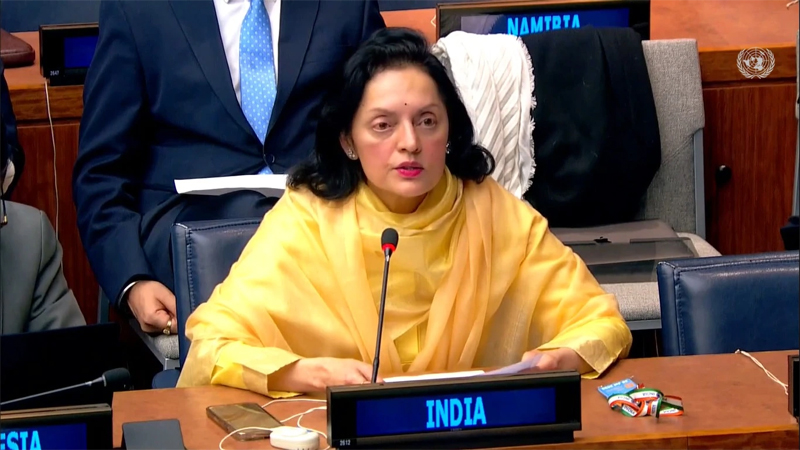United Nations, Dec 2: India, home to the world’s largest youth population, is actively shaping the future and its young minds are leveraging technology as a powerful tool to accelerate progress towards the Sustainable Development Goals, India’s envoy to the UN has said.
In her special address to the annual ‘1M1B Activate Impact Summit’, India’s Permanent Representative to the UN Ambassador Ruchira Kamboj said that India truly believes in the “transformative power” of youth.
“We recognise that the path to achieving the SDGs by 2030 is through harnessing the energy, the creativity and the innovation of our young population,” she said on Thursday.
“India is home to the world’s largest youth population, which is very unique. So we are not just observing the future unfolding, we’re actually actively shaping it,” she said.
Kamboj said that India’s young minds are leveraging technology as a powerful tool to accelerate progress towards the Sustainable Development Goals (SDGs). She said that projects by the country’s youth, ranging from sustainable agriculture to healthcare innovation are “shining examples” of how technology can be a force for good, transforming challenges into opportunities.
The summit was organised by the UN Department of Global Communications (DGC) associated NGO, 1M1B with the support of the Civil Society Unit, DGC. 1M1B (One Million for One Billion) is a United Nations-accredited nonprofit organisation established in 2014.
The organisation is dedicated to digital skilling, change-making and entrepreneurship and has undertaken efforts to train young people throughout India in skills such as Artificial Intelligence (AI), Green Skills, Entrepreneurship, Digital Citizenship, Augmented Reality (AR), Virtual Reality (VR), and other emerging technologies. Over 500,000 students have participated in 1M1B’s programmes so far.
About 50 Indian teenagers represented India at the 7th 1M1B Activate Impact Summit held at the UN headquarters. The students hailed from Bengaluru, Hyderabad, Chennai, Ahmedabad, and Delhi and presented social, economic, and environmental projects to a gathering of industry experts, corporations, non-profits, academia, civil society, UN representatives, Indian officials, and delegates from multiple countries.
Kamboj said that the projects and initiatives demonstrated by the young students at the summit present a “blueprint” for how youth-led initiatives can be scaled and replicated across the globe.
Calling on the young leaders to continue to “inspire, innovate and lead”, Kamboj said their work goes beyond national boundaries and contributes to a global narrative of hope, resilience, and innovation.
“They are not just the leaders of tomorrow. They are the changemakers of today,” she said as she commended the efforts of the 1M1B organisation for creating a platform to empower the country’s youth.
“The future is not only in your hands. You are the future,” she said to the young students at the summit.
Addressing the summit, Director of Outreach at the Department of Global Communications at the United Nations Maher Nasser echoed Kamboj’s remark that India is a very young country. He noted that the median age in India is 28 years old, as compared to 48 years for Japan, 44 for Europe, about 39 for the US and 19 for Africa, making it one of the youngest continents today.
Nasser added that while progress has been made on the SDGs, the world is not on track to achieve them by 2030 and “we are only 15 per cent of where we need to be in achieving the SDGs by 2030.” With only seven years left to achieve the SDGs, Nasser emphasized that the international community has to double its effort.
“We have to double the energy to actually get us to where we need to be,” he said, adding that the world has been impacted by the COVID-19 pandemic and conflicts such as the Ukraine war that have had major impacts on prices of food and energy. These have “set things back,” he said.
Nasser recalled his message on the International Day of Non-violence commemorated on Mahatma Gandhi’s birth anniversary on October 2, and said that it is a “reminder of another legacy that comes to the world from India, that we need to settle our differences and conflicts with non-violence.” “This is why it’s important when generation like yours, innovators, young people in India but also elsewhere in the world come together to address those challenges and see how technology can actually help us meet those challenges,” he said.
Co-Founder of 1M1B Manav Subodh told the summit that 1M1B is a “bold dream” to “activate a million young people who will activate a billion people and create a world with balanced prosperity.” Subodh added that 1M1B is focussed on taking change-making, problem-solving, technology and digital skills “not just to the top students but also to the grassroots of India, so that we can have participation from everybody.” He highlighted that the organisation is present in about 500 schools of India and about 100 universities, offering “sustainability mindset as a foundational skill.” The Summit showcased the best of youth changemakers taking bold action on the SDGs, creating real on-ground impact to inspire more youth across the globe to take actions on the SDGs, the UN said.
The summit will collate inputs and recommendations from diverse stakeholders for the Summit of the Future to be held in September 2024, with a focus on AI, cyber safety, climate action and inclusive technologies. (Agencies)
Trending Now
E-Paper


